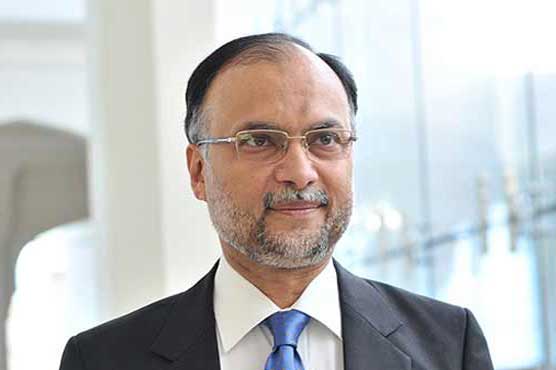Pakistan's future lies in knowledge-based economy: Ahsan

The minister stressed the importance of good management for execution of projects after due approval
ISLAMABAD (APP):Minister for Planning, Development and Reform Ahsan Iqbal Tuesday said Pakistan’s future lay in knowledge-based economy and that was why the government was investing in the higher education sector.
Ahsan Iqbal was chairing a meeting of vice chancellors hosted by the Higher Education Commission (HEC) here to review progress on higher education sector projects approved and funded under the Public Sector Development Fund (PSDP) during the last five years. The meeting also deliberated on the plans for the next PSDP projects.
HEC Executive Director Dr G Ghulam Raza Bhatti and Member Operation and Planning Dr Arshad Ali, and 35 vice chancellors from across the country, in person and through HEC video conferencing facility, attended the meeting, according to a press release.
Addressing the meeting, Ahsan Iqbal appreciated the HEC and academic fraternity for a good teamwork for the uplift of higher education sector.
He said the government believes in turning the country into a knowledge-based economy by investing in the higher education sector. He advised the universities to prepare quality PC-Is of their projects and submit them in due time-frame so that they might be approved for implementation.
Ahsan said serious efforts needed to be made to ensure quality of PC-Is, as compromise on quality lead to failure in project approval.
Expressing concern over capacity constraints, he stressed the need for proper project management. In the budget for FY 2018-19, 46 development projects have been unapproved, he informed.
The minister stressed the importance of good management for execution of projects after due approval.
He said the government approved a total of 130 projects for various regions of the country during the last five years. The sector witnessed a remarkable increase in its development budget from Rs 12 billion in 2012 to Rs 47 billion, he added.
Ahsan said the government launched Pak-US Knowledge Corridor under which it had funding, on annual basis, for 1000 scholars to study in the best US universities. “We need to ensure that the Pakistani scholars avail the opportunities being offered under this initiative to study in the best US universities.”
He said the government had launched a similar programme named UK-Pakistan Knowledge Gateway which offered Pakistani students to acquire quality higher education as well as exposure by studying in the leading UK universities.
He also informed the meeting about the government’s plan to initiate Pak-Russian knowledge platform.
Sharing future vision for higher education sector, the minister stressed the need for evolving a strong mechanism to annually evaluate progress on the seven pillars of Higher Education Vision 2025.
The seven pillars, he added, included turning the universities into centres of excellence in instruction, research and innovation, strong academia-industry linkages, community engagement, corporate governance of higher education institutions, and producing quality products.
He emphasized on universities to develop a Key Performance Indicator (KPI) Matrix to examine development on the goals set under the Vision 2025. He said the human resource development must be aligned with the Vision 2025. The project management needed to be given due importance to ensure proper execution of projects and utilisation of funds in future, he added.
Ahsan Iqbal also shed light on the key initiatives of the government in the higher education sector apart from the academic significance of China-Pakistan Economic Corridor (CPEC). He said the government established FATA University, University of Gwadar and sub-campuses of various universities at district level, launched Technology Development Fund (TDF), set up National Centre for Excellence in Big Data and Cloud Computing, and initiated Faculty Development Programme for 2000 faculty members. The country’s security depended upon the uplift of higher education sector, he added.
Dr Arshad Ali said the HEC was committed to keeping up with the government’s expectations of playing it pivotal role in building the knowledge-based economy. He thanked the minister for his personal interest in the uplift of higher education sector.
He said the HEC and the Planning Commission closely worked for the holistic development of higher education sector.

